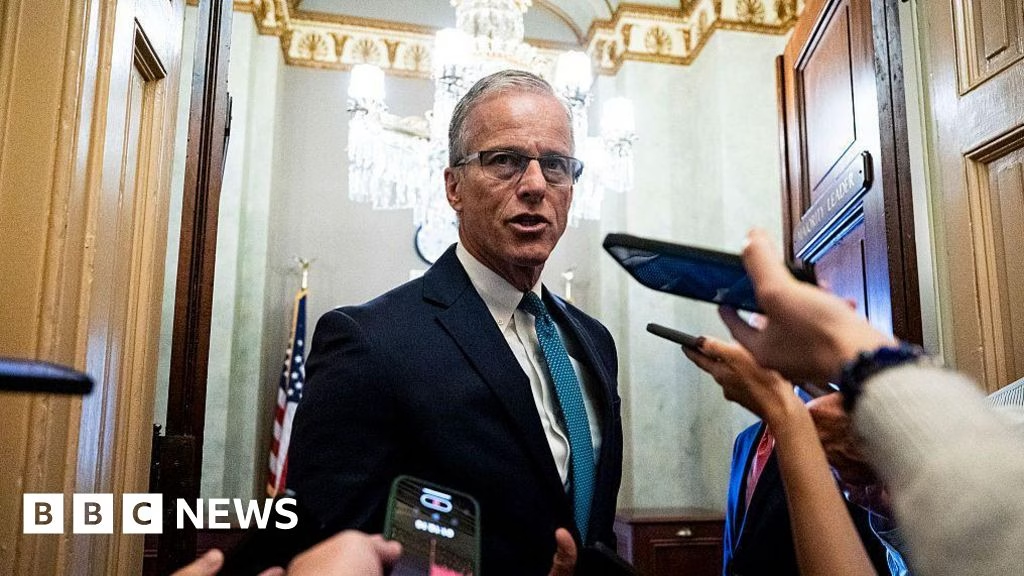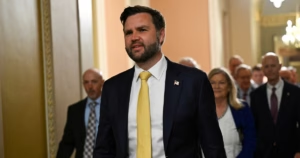Senate Republicans narrowly advanced a budget bill crucial to President Donald Trump’s second-term agenda ahead of a self-imposed 4 July deadline.
In a 51-49 vote largely along party lines, the Senate moved to open debate on the bill, a significant initial hurdle that Republicans had struggled to overcome. Two Republicans joined Democrats in opposing the move to take up the bill.
Party leadership worked hard for the initial vote on the “Big Beautiful Bill” on Saturday, following the release of its latest version – all 940 pages – shortly after midnight.
Republicans were divided over how much to cut welfare programs to extend $3.8tn (£2.8tn) in Trump tax breaks.
The bill’s fate on the Senate floor remains uncertain as Republicans continue to argue over its provisions. Vice-President JD Vance visited the Capitol on Saturday night to offer a tiebreak vote, though party leaders eventually negotiated majority support without his assistance.
Meanwhile, Democrats have stated their intention to slow down the process in protest against the bill, with Senate Minority Leader Chuck Schumer insisting his party will force Republicans to read out the nearly 1,000 pages of text before the Senate can debate and potentially vote on the final version.
Some Republicans in the House of Representatives have also expressed concerns over the changes in the Senate version of the bill, which was passed by the House of Representatives by a single vote last month.
The Senate’s version of the bill includes changes intended to address points of disagreement among Republicans. Despite this, party leaders still faced difficulties securing enough votes.
In a memo sent to Senate offices, the White House endorsed the latest revisions to the bill and called for its passage.
The memo reportedly warned that failing to approve the budget “would be the ultimate betrayal.”
Rand Paul of Kentucky and Thom Tillis of North Carolina joined Democrats in rejecting the bill.
As the Senate vote concluded, President Trump posted on Truth Social, his social media platform, stating Tillis was making a “BIG MISTAKE.” He wrote that he would be meeting with candidates who “come forward wanting to run in the Primary against ‘Senator Thom’ Tillis.”
However, the bill won over some Republicans who had expressed skepticism, including centrist Senators Lisa Murkowski of Alaska, Susan Collins of Maine, and Ron Johnson of Wisconsin, who initially voted against it but changed his vote at the end of the session.
The latest version was designed to appease some Republican holdouts.
Other amendments incorporate input from the Senate parliamentarian, an official reviewing bills to ensure compliance with chamber procedures.
It also includes increased funding for rural hospitals, after some party moderates argued the original proposal would harm their constituents.
There are changes to the Supplemental Nutrition Assistance Program (Snap), which provides food benefits to low-income Americans.
Alaska and Hawaii are temporarily exempted from a proposed requirement for some states to start funding the program, currently fully funded by the federal government.
The revision comes after Alaska’s two Republican Senators pushed for the exemption.
The legislation retains core components, including extending tax cuts passed by Republicans in 2017 and adding new cuts Trump campaigned on.
More contentious measures, including restrictions and requirements on Medicaid – a healthcare program used by millions of elderly, disabled, and low-income Americans – remain in place.
Democrats have heavily criticized the provision, saying it will limit access to affordable healthcare for millions of Americans.
The Congressional Budget Office estimates that 7.8 million people would become uninsured due to such Medicaid cuts.
Senator Patty Murray, a Democratic state delegated from Washington, argued on social media that the bill contains “the largest healthcare cuts in history.”
Another critic of the bill is Elon Musk, who stated on X that the latest iteration of the bill “will destroy millions of jobs in America and cause immense strategic harms to our country.”
Musk took issue with taxes the bill proposes on solar and wind energy projects.
The bill now requires a simple majority to pass the Senate. With Republicans holding 53 seats out of 100, plus a tiebreaker from Vice-President JD Vance, the party can only afford three defections.









